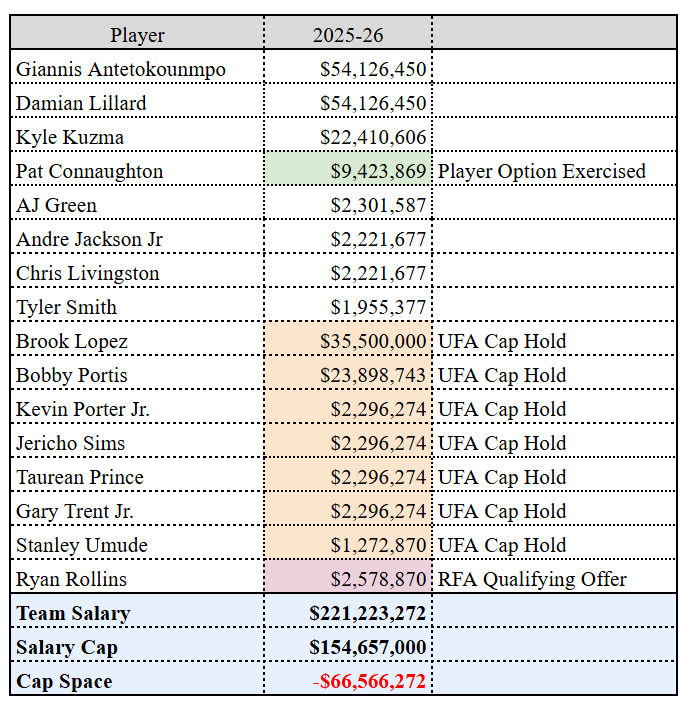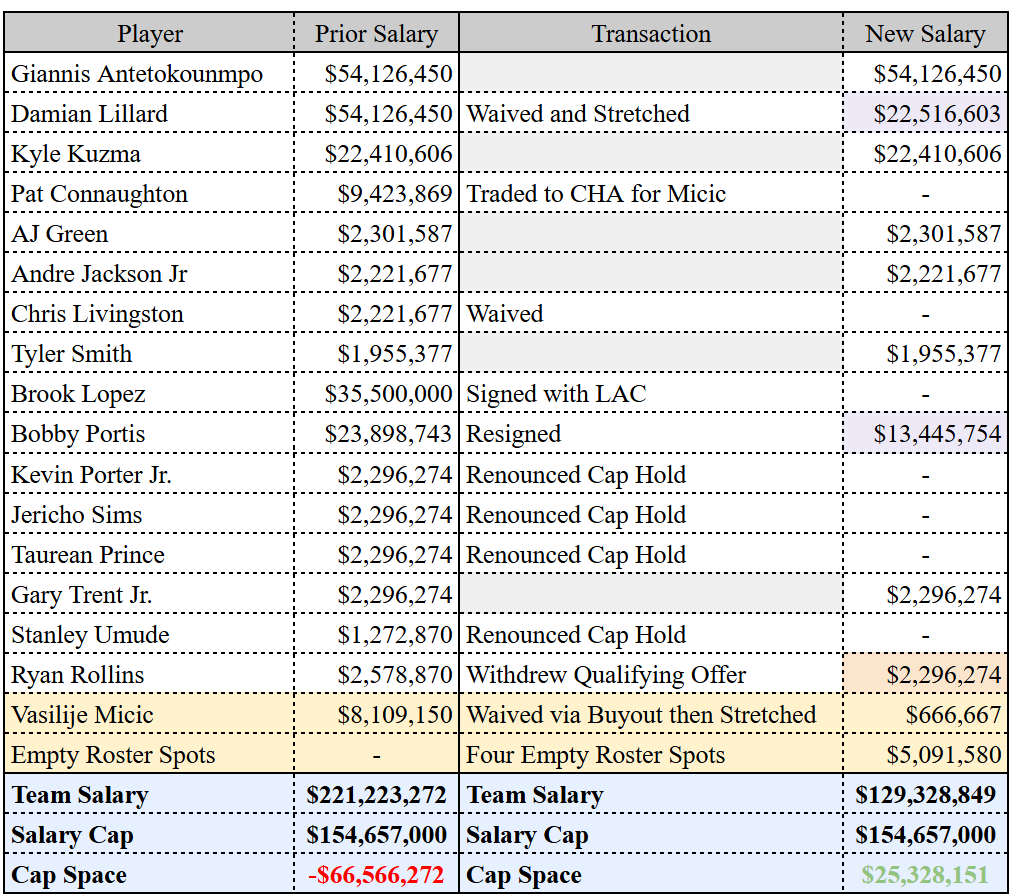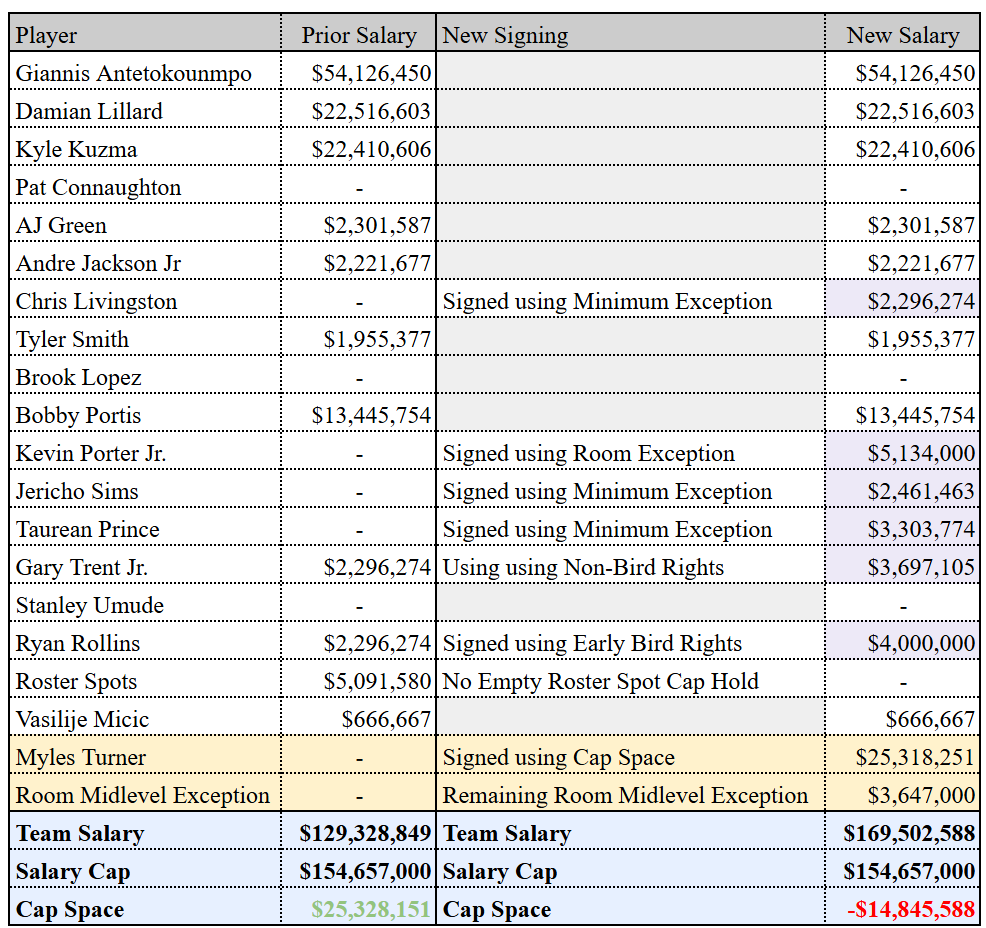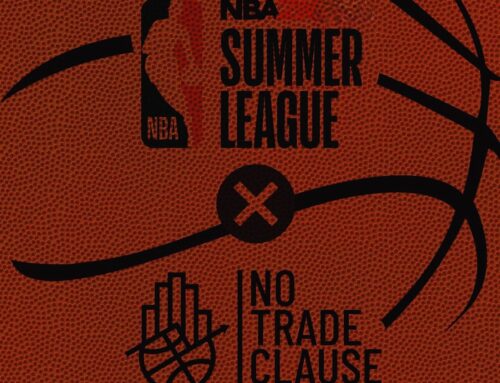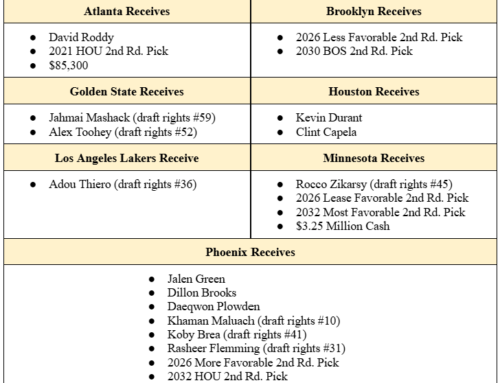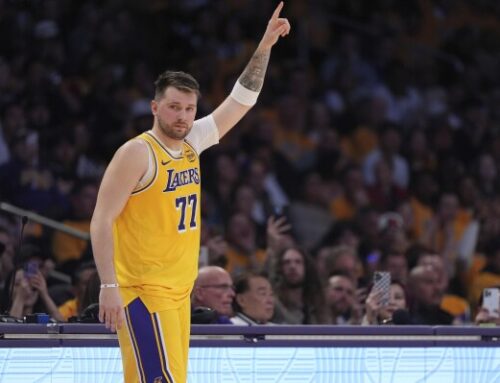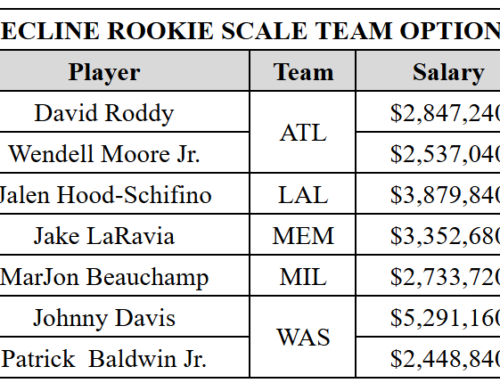Milwaukee executed the most shocking wave of transactions this offseason: waiving Damian Lillard on their way to clearing Cap Space to sign Myles Turner in free agency. But Lillard wasn’t the only obstacle to overcome.
Here is how Milwaukee was able to clear enough space to sign Turner, and then resign the majority of its own players over the Salary Cap.
July 1st Outlook
Entering the new Salary Cap Year on July 1st, Milwaukee was significantly over the Salary Cap with seven Unrestricted Free Agents (UFA) and a Restricted Free Agent (RFA) in Ryan Rollins with a pending Qualifying Offer (Q.O.).
Free Agent Cap Holds
A quick explanation on Free Agent Cap Holds. Teams have “Bird Rights” over players that finish their contract with the team, which allows them to resign them over the Salary Cap. Cap Holds were created to avoid a situation where a team with cap space would first use all of its cap space on new players, and then once all of its Cap Space is taken up, then resign is Bird Rights players over the Salary Cap. It’s a method of “holding” a hypotethical amount of money in place for the player if they were to resign him.
Cap Hold amounts are formulaic, based upon contract type and prior salary. They can be removed, called “renouncing” Cap Holds, but then the team loses the Player’s Bird Rights. We will discuss this a bit more in a moment.
Pending Options Entering 2025-26 Seasons
Pat Connaughton – Connaughton exercised his Player Option for 2025-26 for $9.4 million.
Bobby Portis – Portis declined his $13.4 million Player Option. This made him a UFA with a higher Cap Hold of $23.8 million.
Kevin Porter, Jr. – Porter Jr. declined his $2.55 million Player Option. This made him a UFA with a lower Cap Hold of $2.2 million.
Clearing Space
Trading Connaughton
Milwaukee was able to trade Connaughton in exchange for Micic, who was bought out as discussed below.
Waiving, Stretching and Buying Out
Damian Lillard
The biggest move of the offseason was Milwaukee deciding to waive Lillard. He had $112,583,016 remaining guaranteed Salary because of a Player Option in 2026-27. Because it’s over two seasons, Milwaukee could stretch the “dead” Salary over five seasons (double the number of remaining seasons, plus one). Therefore, his dead salary for this season is $22,516,603.
Vasilije Micic
The most underrated portion of this entire story is Micic’s buyout. Micic had $8.1 million guaranteed and he agreed to forego $6.1 million in his buyout. Considering his entire NBA earnings consist of one contract signs two seasons ago, this is significant. Milwaukee can thank Hapoel Tel Aviv of the Isreali league, Ligat HaAl, for offering him a 3-year $18 million contract. Milwaukee then stretched the $2 million in dead salary across three years, for $666.667 per Season. This put Milwaukee at the maximum 15% of the Salary Cap permitted to be stretched in a Single Season.
Renouncing Cap Holds
Milwaukee renounced the UFA Cap Holds of Porter, Jr, Sims, Prince and Umude to clear additional Cap Space. Lopez signed with the Clippers. When a Player signs with another team his Cap Hold is automatiically extinguished.
Milwaukee did not renounce the Cap Hold of Gary Trent, Jr. When you renounce a Player’s Cap Hold, you lose his Bird Rights. Therefore, if you want to resign him, you either have to use your newfound Cap Space or find another Salary Cap Exception to sign him over the Salary Cap. If Milwaukee thought another team might offer him more than the Minimum Salary, it’s a good idea to retain his Bird Rights to be able to do the same.
Milwaukee also renounced some old Cap Holds from players that completed a contract for them and have never played for another team: Jeff Teague, Meyers Leonard, Danilo Gallinari, Goran Dragic Patrick Beverley and Thanasis Antetokounmpo. These often sit on a team’s books until Cap Space is needed because it’s not necessary to renounce them (it’s often funny to look at cap sheets for teams who haven’t had Cap Space for many years and see some of the old players still on their books).
Withdrawing Ryan Rollins Q.O.
Milwaukee withdrew the Q.O. for Rollins. Rollins became a UFA and could sign with another team. Because he is a UFA, he still had a Cap Hold, but it dropped from his Q.O. amount to his UFA Cap Hold amount, clearing an additional $300k in cap space. Similar to Trent Jr., Milwaukee didn’t renounce his Cap Hold in order to retain his Bird Rights.
Waiving Chris Livingston
Milwaukee waived Livingston’s contract. This cleared an additional $2.2 million in Salary. You’ll notice there is no Cap Hold created because Livingston didn’t complete his Contract with Milwaukee.
Resigning Bobby Portis
Prior to signing Turner, Milwaukee had to resign Portis to remove his $23.8 million Cap Hold. Milwaukee saves the difference between his starting Salary in his new contract and his UFA Cap Hold. Portis signs to the same amount as the Player Option he declined–$13,445,754.
Why did Portis decline his Player Option just to resign for the same exact amount rather than just extend? Good question. The only answer I can discern from the two contracts is the 15% Trade Kicker. In his prior Contract, Portis had a 15% Trade Kicker. Had he signed an extension off the Player Option, the Trade Kicker could be removed, but if he was traded during the original term of the Contract (i.e. during this Season), then the Trade Kicker would still be triggered. Signing an entirely new contract eliminates this possibility. Milwaukee may have asked he sign a new contract without the Trade Kicker in exchange for the longer term. Note that the 15% Trade Kicker would take his salary from below the NTMLE amount to over the NTMLE amount, which may eliminate some teams who retained the exception from acquiring him in trade. His trade eligbility restriction is also shortened from January 6th (if extension was signed with 8% raises) to December 15th (signing as a UFA).
Roster Spot Cap Hold
When a team drops below 12 roster posts, a new Cap Hold is created to fill that roster spot. The roster spot must be filled, and salary will be added. So Minimum Salary is held in its place.
The UFA/RFA cap holds count toward roster spots, but after renouncing those Cap Holds, Milwaukee dropped to only eight spots. There were then four roster spot Cap Holds for the amount of Minimum Player Salary for 0 Years of Service (4 x $1,272,870 = $5,091,580).
Signing Turner and Retaining Roster
Signing Turner
After the transactions discussed above, Milwaukee cleared the Cap Space to sign Turner as a free agent. Once Milwaukee uses Cap Space in the offseason, they become a “Cap Space Team” and operate as one throughout the rest of the year. This doesn’t mean they are prohibited from going over the Salary Cap, but it means they are then given the Room Midlevel Exception ($8.7 million) and are prohibited from using the Non-Taxpayer Midlevel Exception ($14.1 million) and the Bi-Annual Exception ($5.1 million).
Resigning its Players
Kevin Porter, Jr.
The Team exhausted all of its Cap Space on Turner. As a result, signing any other player must be done using a Salary Cap Exception to sign the Player over the Salary Cap. Using the Room Midlevel discussed above, Milwaukee retains Porter, Jr. Milwaukee now has $3.6 million remaining in the Room Midlevel, which may entice a player to sign over their minimum salary.
Jericho Sims, Taurean Prince and Chris Livingson
Because their Cap Holds were renounced to clear space for Turner, Milwaukee lost Bird Rights for Sims and Prince. Livingston was also waived, eliminating any Bird Rights due to not completing his Contract. Therefore, the only exceptions available were the Minimum Exception and the remaining Room Midlevel. All players agreed on the Minimum Contracts.
It should be noted that renouncing Cap Holds doesn’t not terminate the “Bird Rights Clock” for Sims and Prince. Since they completed their contracts with Milwaukee, their Bird Rights years continue to accumulate from their prior contract. Livingston, on the other hand, has no ongoing Bird Rights with the Team because his Contract was not completed, so Milwaukke will only have Non-Bird Rights after this Season.
Gary Trent, Jr. and Ryan Rollins
Milwaukee retained Bird Rights on Trent, Jr. and Rollins (despite withdrawing the Q.O.), because Milwauke did not renounce their Cap Holds. Milwaukee therefore used their Bird Rights to sign both of them to new contracts over their Minimum Salaries.
